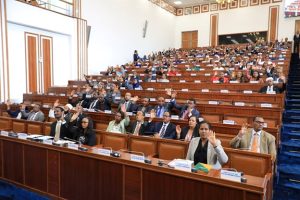
Speeding up planned privatization, cutting spending and maximizing export and tax revenues are some of the measures economists propose to ease the country’s debt burden. Their comments came following government’s recent announcement that the total debt burden of the country reached 52.57 billion USD with external debt amounting 26.93 Billion USD until last March 2019.
Since coming into power Dr. Abiy Ahmed has been cautious about the country’s debt burden vowing to take various measures to overcome the high debt trouble the country faces. From planned privatization to tax reforms, the government has been toiling to ease debt burdens by improving revenues.
Despite recent moves with some yet to be realized and introduced, a recent report by the Ministry of Finance and Economic Cooperation revealed that the country’s external debt remains at high risk of debt distress reaching 26.93 Billion USD. And the internal debt burden also stands over 25 billion USD. It was also disclosed that though Ethiopia’s economy is expected to grow by 9.2 percent for the 2018/19 fiscal year, high debt burden still poses the greatest challenge to the economy.
Ethiopia is caught between a rock and a hard stone. While the country has to create jobs and finalize ongoing mega projects, it should also ease the backlogs of high debt burden. Unless prompt and long term measures are put in place, the problem may back the country’s economy into a corner, says Dr. Gutu Tesso, an economist and Oromia Economists Association President.
The debt burden poses serious risk and it requires both short and long term interventions. One possible remedy could be speeding up the partial or full privatization of state-owned projects such as sugar factories. With capital cost of delayed mega projects inflating and requiring additional subsidy, it behooves the government to put them on sale so that the private sector operate them efficiently and cover their loans, the economists adds.
“Cutting spending and maximizing export income also should also on the cards to ease the burden. Lavish spending has been playing its negative part while low export income forcing the country to look for loans for foreign currency sources,” he adds. The government should either reduce costs or increase incomes, Dr. Gutu says adding: “Increasing remittance has to be another priority area in which the government should put due emphasis on,” he underscores adding “restrictive public-sector policies, especially on completing ongoing projects and prudent budget execution are also useful to deal with the acute shortage of currency. Attracting FDI and increased formal inflow of remittance from the diaspora may also help ease the problem.”
Pulling more direct investments is another task which the government should through its full weight behind on. The construction of industrial parks and other infrastructural facilities means nothing unless foreign investors come and engage in production and export. Hence the government needs to come up with more incentives so that foreign investors continue to engage in.
However, Dr Gutu says the government needs to equally pay attention to revise its policies and strategies of macro economic reforms. It has been the way the economic policies adopted that led to the foreign currency crunch and debt distress. It is time to set clear economic path and come up with policies and strategies that can serve the country for decades to come.
On the other hand, diversifying tax incomes and domestic revenues can increase the sources of government incomes. Compared to other countries, the country’s tax collection rate is very low. Hence, if the government is planning on disburse its debts, its income collection needs to improve, said Dr. Abdiyuya Ahmed is an Economist. He previously told The Ethiopian Herald that it is up to the government to find efficient local and foreign investors who can also generate income from exports.
The tax mobilizations and transformation reforms in the country contributed to a better domestic revenue collection and external financial inflow in 2018/19, says Haji Ibsa Communication Director at Ministry of Finance and Economic Cooperation he states. Haji noted that 8 reforms has been undertaken within the taxation system, which are expected to bring more than 20 billion birr increases in tax revenue in the years ahead.
Of late, the Office of the Prime Minister revealed a new home grown economic program to overcome some of the pressing challenges facing the economy. According to the Office of the Prime Minister press statement, the government has cut public spending and funneled capital supply that exceeds pervious same period by 50 percent to the private sector.
Beside macro economic reforms, the government has introduced multifaceted structural reforms to encourage private investments. These include improving investment climates for private sector, logistic and powers sectors, says Mamo Mihret PM Policy Advisor adding: “the government has identified unemployment, inflations foreign currency shortage to poise major challenges to the growing economy. Though the last few years have seen fast economic growth , debt burden , inflation, low export rate and forex shortage if not addressed well may put halt on the momentum.”
Federal Investment Commission Commissioner, Abebe Abebayehu, for his part, said that the government as per of pulling more private investment is easing business registration and permit, tax collection system and other constraints. To address financial constraint, the government also allowed capital lease financing where business can have access to credit services by using their equipment for collateral.
The Ethiopian Herald, August 23/2019
BY DESTA GEBREHIWOT





